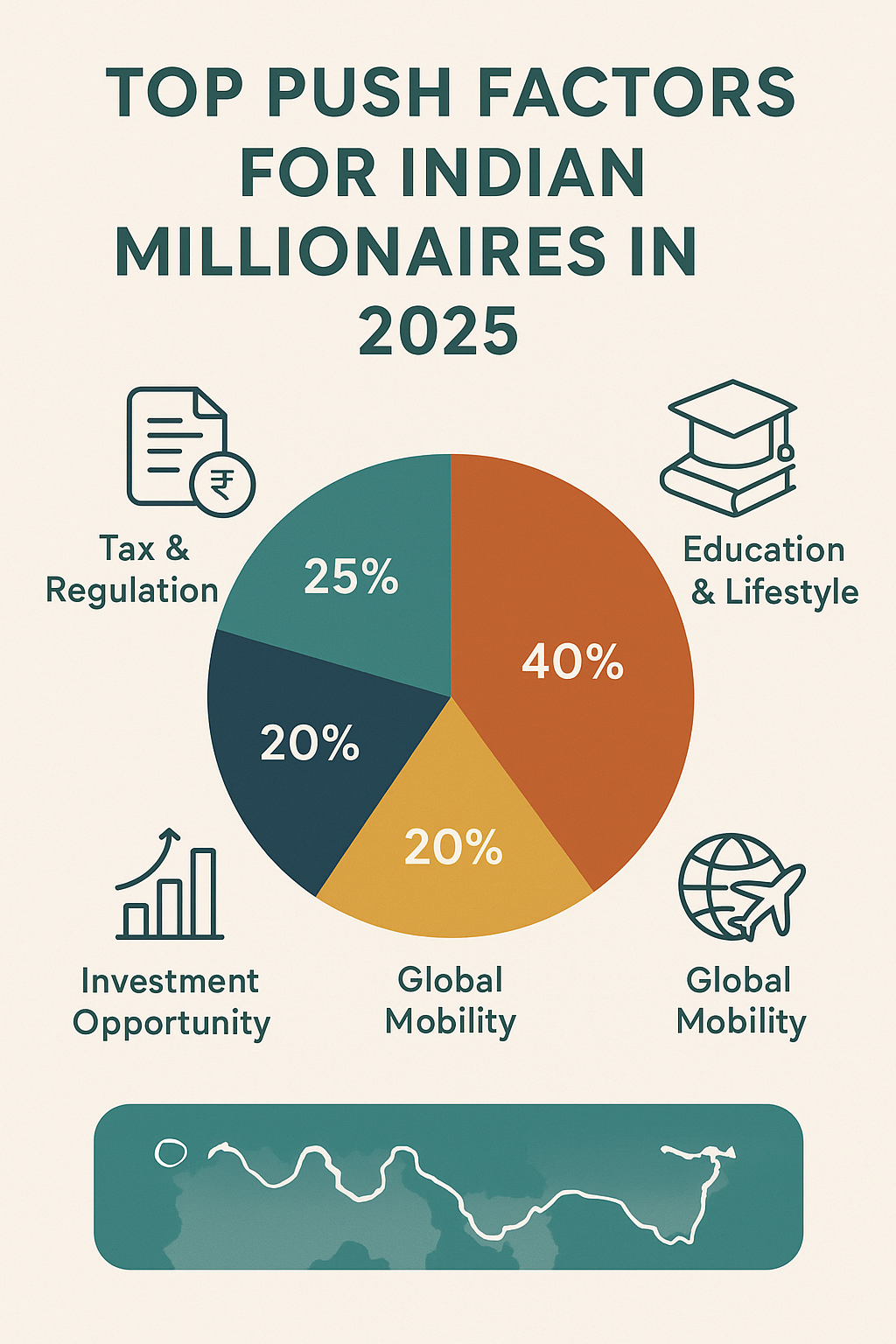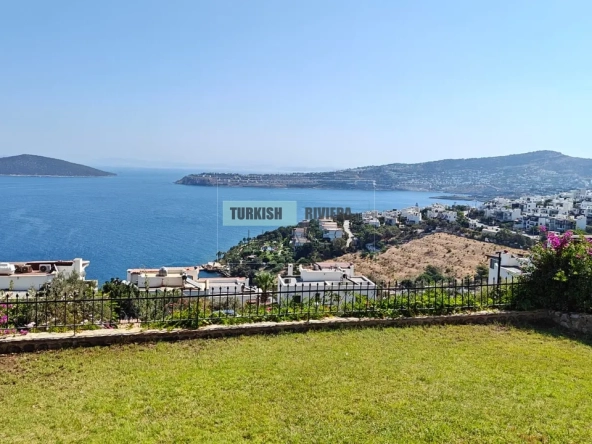For many wealthy Indian families—from Mumbai, Delhi, Bengaluru—Turkey is no longer just a holiday destination. It’s fast becoming a serious base — an investment, lifestyle, and security play. Here’s what’s driving this shift, what makes Turkey special, and how the social, economic, and political factors combine to make it an attractive option.
What’s Pushing Indian HNIs Outward
Before looking at what pulls people to Turkey, the push factors from India & similar contexts are important:
- Tax and regulation burden: As wealth grows, so do tax liabilities, compliance requirements, complexities of cross-border income, inheritance, etc. For many, moving part of wealth to jurisdictions with more favourable tax or simpler laws is increasingly appealing.
- Global mobility & education: Indian families want children to get global education, live in places with good healthcare, less pollution, safer public services, and ease of travel. Residency or citizenship abroad helps.
- Diversification of assets & risk: Economic cycles, currency risk (INR fluctuations), political/regulatory uncertainty make spreading risk attractive (in real estate, foreign property, multiple homes/citizenships).
- Quality of life considerations: Climate, lifestyle, environmental quality, less traffic, more access to nature or coastlines, or the sea-lifestyle, can be a strong pull.

What Turkey Offers: The Pull Factors
Turkey combines a compelling mix of features — financial, political, social — that are increasingly attractive to Indian HNIs. Let’s break them down.
Economic & Investment Advantages
- Citizenship by Investment & Property Rules
- Foreigners who buy real estate in Turkey worth at least USD 400,000 can apply for Turkish citizenship. The property must be held for 3 years.
- Once citizenship is obtained, benefits include visa-free or visa-on-arrival access to 110+ countries, inclusion of spouse and children under 18.
- Foreign property ownership is protected under law; foreigners have equal rights. No need for a Turkish partner.
- Strong Returns and Affordability
- Turkish real estate in cities like Istanbul, Antalya, Izmir offers rental yields of ~5-8% annually, which is often higher than many mature markets.
- Coastal and tourism-heavy regions (e.g. Bodrum, Antalya) can see even higher seasonal yields, especially for short stays & holiday rentals.
- Property prices remain relatively affordable compared to Western Europe or prime Middle East markets, meaning lower entry costs for value with upside.
- Tax & Regulatory Incentives
- Low annual property taxes (0.1-0.6% typical of property value) in many cases.
- No capital gains tax if property is held more than 5 years.
- VAT exemptions in certain conditions for foreign buyers; favorable conditions in certain zones / projects.
- Government-incentive programs for foreign and domestic investment: exemptions, tax reductions, customs-duty waivers when importing or buying equipment or building in designated zones.
- Infrastructure, Urban Development & Strategic Location
- Mega projects like expanded airports, new bridges, upgraded ports, improved transportation and urban transformation (redevelopment of older districts, modern housing). These tend to increase property values in surrounding areas.
- Turkey sits at the crossroads of Europe and Asia — making it a hub for travel, trade, culture. For Indian investors, flights to Istanbul are frequent; Turkey acts as a gateway to both Europe and the Middle East.
- Sectoral Opportunities Beyond Real Estate
- Incentives for technology, green energy, exports, R&D. If an investor wants to put capital into businesses or joint ventures, there are programs. For example, free zones, tech parks, R&D tax benefits.
- Regional industry incentives: tax reliefs, funding for machinery, support for setting up in less developed regions to spread growth
How Antalya is Emerging as the most favoured Destination of Turkey
- 450K Euro for Turkish Citizenship Villas by the Golf Course
- Yearly up to 7 % rental income
- Yearly up to 15 % capital appreciation
- You can swim and SKII at the same time
- Top 5 most visited city in the world
- International school for foreign families’ kids
- The Antalya airport is second biggest airport in Turkey and directly more than 400 destinations can be travelled from Antalya airport
- Approx 16 million tourist visit last year from across the globe
- Many Muslim Indian want to settle down Antalya and Istanbul
- Several beautiful mosques are the major attraction of this city.
- Antalya is a home of many famous worldwide golf courses
- Popular destination for great clean beaches and nature
- Many millionaire Indians organise their children wedding in famous luxurious hotels of Antalya
Social & Political Context
No investment is just financial. Families care about stability, society, culture — here’s where Turkey’s position is a mixed but generally positive one for many Indian investors.
- Societal & Cultural Appeal
- Rich history, cosmopolitan cities: Istanbul in regions like Beşiktaş, Nişantaşı offer what many Indians look for: international schools, modern hospitals, cosmopolitan food, people used to international lifestyles.
- Lifestyle by the coast: places like Bodrum, Antalya offer Mediterranean climate, sea-front living, coastal culture, leisure, lower pollution, quieter environments — appealing for vacations, second homes, retirement.
- Political Landscape & Risks
- Turkey has made strong efforts to attract foreign investment via law / incentives; foreign investors are legally protected in many regards.
- But there are political risks: There have been concerns from rating agencies and markets about political tensions, centralization of power, curbs on opposition; for example, arrests of political figures have occasionally shaken investor confidence.
- Currency & inflation volatility is also a factor: Turkish lira has had periods of turbulence. This risk must be managed (i.e., thinking in USD/EUR terms, or hedging).
- Legal & Institutional Considerations
- Legal protections exist: foreigner property rights, clear title deed (“Tapu”), inheritance law.
- Bureaucracy is less burdensome than many think; buying property can be done relatively quickly — often in under 10 days for straightforward cases.
- Investor should still use local legal advice & ensure due diligence (title, developer’s track record, zone / project approvals).
Key Aspects Indian Families Must Know
Here are particular features that matter especially for Indian high-net-worth families when considering Turkey:
| Feature | Why It Resonates with Indian HNIs |
| Citizenship + Passports | Having a second citizenship gives global mobility, easier travel, possible education & business flexibility. Indian families often look for such “Plan B” security. |
| Education & Healthcare | Turkey has good international schools, hospitals in major cities; for those relocating long term or semi-permanent, this matters heavily. |
| Proximity & Ease of Travel | Turkey is relatively close compared to Europe/North America; good flight connectivity. Time-zone advantages for business travel. |
| Lifestyle | Mediterranean climate, sea-side living, coastal towns, culture and history. Indian families often value calm retreats, natural beauty, and a slower pace as counterpoint to city life in India. |
| Portfolio Diversification | Renminbi, INR, etc., all have currency & policy risks. Investing in Turkish real estate, or having assets in USD/EUR terms, helps diversify. Also, Turkish real estate often priced lower per sq ft for comparable amenities than many Indian metros’ luxury segments. |
The Challenges & Mitigations
No place is perfect. Some of Turkey’s issues are real. For Indian investors, being aware and planning for them makes the difference.
- Inflation & Currency Volatility: The Turkish lira has seen fluctuation; inflation has been high. Mitigation: purchase in foreign currency when possible; lock in USD or EUR-denominated loans; use investments that hedge inflation (real estate tends to do this).
- Political Risk: As mentioned, recent political events have unsettled markets. Mitigation: choose projects in stable regions, avoid speculative ones; spread risk geographically; follow legal safety.
- Legal / Regulatory Changes: Laws can change; for example, thresholds for citizenship or incentives may shift. Always check the current rules with local experts / lawyers.
- Maintenance / Management: If using property for rentals (short-term or holiday), local property management, guest logistics, occupancy seasonality need to be considered.
Indian Investor Case Vision: A Scenario
Here’s a hypothetical yet realistic scenario to help you visualise how an Indian HNI family might use Turkey:
The Khan Family from Mumbai buys a sea-view villa in Bodrum for USD 450,000, satisfying the citizenship requirement. They hold it for 3 years. Meanwhile:
• They rent it out during holiday seasons — strong demand from European tourists, digital nomads. Income yields of ~7-8%.
• Meanwhile, their children spend part of the year in Istanbul at an international school, using the healthcare system locally for check-ups.
• They enjoy Mediterranean climate, quieter life in summer, access to flights to Europe & India.
• Citizenship gives them a passport with visa-free access to many countries, second residency option.
• As property values increase (say ~10-15% in prime coastal areas over 3-5 years), they secure capital appreciation.
This combines social, economic & political benefits with lifestyle and security.
Final Thoughts
“From Mumbai to the Mediterranean” isn’t just poetic — it’s increasingly pragmatic. For Indian high-net-worth families, Turkey offers a rare blend: reasonable cost-of-entry, lifestyle, mobility, legal and tax incentives, and potential for growth.
If you’re considering expanding your horizons beyond India—whether for safety, education, better living, or simply to enjoy a Mediterranean sunset — Turkey is among the top contenders.





